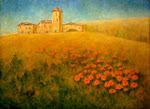Translating poetry presents challenges not found when translating basic text. You arm yourself with the same essential tools: dictionary, verb book, and thesaurus, but for poetry translations you need to add creativity. Your aim is to maintain a line-for-line translation, while sustaining the author’s “voice and subtext.” Given the differences in sentence structure between languages, this can be tricky and occasionally no matter how you hard you try, a line-for-line is impossible.
Other problems occur when you overuse the thesaurus to a point where the word takes on a new meaning. This can happen when you think your word fits the “idea” better than that of the poet. A good translator has to put ego aside and keep the poet in mind at all times. If you think you can do better, write your own poetry, don’t rewrite the work of someone who has trusted you and paid you to do a worthy translation.
There are times when a poem is so encumbered in idiomatic nuance and ambiguous metaphors it can take as long, or possibly longer, to translate than it took the poet to write it. I’ve experienced this on a few occasions, where even after extensive conversations with the poet, I’m still scratching my head and wondering how he got “this” idea out of “that.”
There are some who think translating is little more than looking up each word and writing it down. If you believe that’s the case, you need only go to Babel Fish, or one of the other translating sites on line. Paste a small text in another language and then “hit” translate. Many times the translation, although in English, is almost as difficult to understand as its foreign counterpart.
Welcome
Many artists dream about painting in Italy. Now, as retiring baby-boomers are increasingly taking up “brush and pallet knife,” more than ever, painting in Italy is the “thing.” Every day, a new “Artist’s” tour of Italy crops up in travel sections of the newspaper and on the Internet. But there still remains a majority of artists who prefer to “go it alone.” They are independent in their artistic styles, and prefer to be independent regarding their travels in Italy . This blog intends to target these free spirited artists who still need guidance to the best places to paint, especially those idyllic gems that are little known and less traveled. Certainly, independent travelers who are not artists will also benefit from this blog.
With a few exceptions, this blog is not a guide to restaurants, lodging, rental cars, or shopping, (except for art supplies.)
Sprinkled among the posts are: my paintings, and a few Italian proverbs and poems written by notable Italian authors for whom I work as a translator.
Please visit my website to view my original art:
http://www.pamelaallegretto-franz.com/
Giclee prints of my paintings, ranging from greeting size to poster size, can be purchased at:
http://pamela-allegretto.fineartamerica.com/
With a few exceptions, this blog is not a guide to restaurants, lodging, rental cars, or shopping, (except for art supplies.)
Sprinkled among the posts are: my paintings, and a few Italian proverbs and poems written by notable Italian authors for whom I work as a translator.
Please visit my website to view my original art:
http://www.pamelaallegretto-franz.com/
Giclee prints of my paintings, ranging from greeting size to poster size, can be purchased at:
http://pamela-allegretto.fineartamerica.com/
Monday, March 30, 2009
Subscribe to:
Post Comments (Atom)











No comments:
Post a Comment
Thank you for your comment. Grazie per i complimenti.
Note: Only a member of this blog may post a comment.